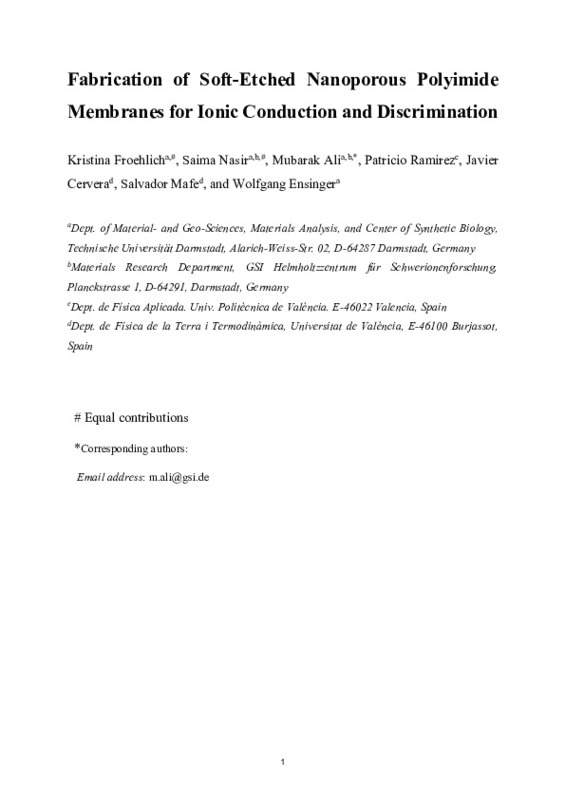JavaScript is disabled for your browser. Some features of this site may not work without it.
Buscar en RiuNet
Listar
Mi cuenta
Estadísticas
Ayuda RiuNet
Admin. UPV
Fabrication of soft-etched nanoporous polyimide membranes for ionic conduction and discrimination
Mostrar el registro sencillo del ítem
Ficheros en el ítem
| dc.contributor.author | Froehlich, Kristina
|
es_ES |
| dc.contributor.author | Nasir, Saima
|
es_ES |
| dc.contributor.author | Ali, Mubarak
|
es_ES |
| dc.contributor.author | Ramirez Hoyos, Patricio
|
es_ES |
| dc.contributor.author | Cervera, Javier
|
es_ES |
| dc.contributor.author | Mafe, Salvador
|
es_ES |
| dc.contributor.author | Ensinger, Wolfgang
|
es_ES |
| dc.date.accessioned | 2023-12-05T19:03:12Z | |
| dc.date.available | 2023-12-05T19:03:12Z | |
| dc.date.issued | 2021-01-01 | es_ES |
| dc.identifier.issn | 0376-7388 | es_ES |
| dc.identifier.uri | http://hdl.handle.net/10251/200518 | |
| dc.description.abstract | [EN] Ionic selectivity in nanopores is usually based either on steric or charge exclusion mechanisms. By simultaneously incorporating both mechanisms into a functionalized membrane, an improved control over selectivity can be achieved. We describe the fabrication and experimental characterization of alkali metal cation-selective nanopores in heavy ion-tracked polyimide (PI) membranes using the soft-etching (SE) technique. The latent ion tracks in the PI membrane are selectively dissolved by an organic solvent to form tiny pores without affecting the bulk material. The ionic transport properties of SE-PI membranes are characterized using different electrolyte solutions containing alkali metals, divalent metals, and organic cations under symmetric and asymmetric electrolyte conditions. Under symmetric conditions, the pores exhibit ohmic behavior when exposed to alkali metal chlorides and ammonium chloride solutions while divalent cations cannot pass through the pores as evidenced from the current-voltage curves. For the case of asymmetric electrolyte conditions, current rectification suggests pore blockage from the side of membrane exposed to divalent cations and tetraalkylammonium (TAA) cations. The experimental data show that the SE-PI membranes efficiently discriminate alkali cations from divalent metal cations and ammonium cation from TAA cations. The ionic conduction of the membranes is also sensitive to the mole fraction of Ca2+ in multi-ionic solutions. The ionic transport experiments further confirm that the nanopores allow significant alkali cation fluxes while rejecting divalent cations. Based on the good stability and high selectivity, the solvent treated PI membranes constitute remarkable candidates to be employed in applications concerning a wide range of electrolyte solutions. | es_ES |
| dc.description.sponsorship | P.R., J. C., and S. M. acknowledge the funding from project PGC2018-097359-B-I00, Spanish Ministry of Science and Education, and FEDER, Spain. The authors (K.F., M.A., S.N. and W.E.) acknowledge the support from the LOEWE project iNAPO, Hessen State Ministry of Higher Education, Research and the Arts, Germany. The authors are thankful to Prof. C. Trautmann and Dr. E. Toimil Molares (GSI, Material Research Department) for their support with the heavy ion irradiation experiments and Mr. E. Schubert for the designing of electrochemical cells. The heavy ion irradiation is based on a UMAT experiment, which was performed at the X0-beamline of the UNILAC at the GSI Helmholtzzentrum fuer Schwerionenforschung, Darmstadt (Germany) in the frame of FAIR Phase-0. | es_ES |
| dc.language | Inglés | es_ES |
| dc.publisher | Elsevier | es_ES |
| dc.relation.ispartof | Journal of Membrane Science | es_ES |
| dc.rights | Reconocimiento - No comercial - Sin obra derivada (by-nc-nd) | es_ES |
| dc.subject | Heavy ion irradiation | es_ES |
| dc.subject | Track-etching | es_ES |
| dc.subject | Ionic transport and discrimination | es_ES |
| dc.subject | Synthetic nanochannels | es_ES |
| dc.subject | Polyimid membranes | es_ES |
| dc.subject | Nanofluidics | es_ES |
| dc.subject.classification | FISICA APLICADA | es_ES |
| dc.title | Fabrication of soft-etched nanoporous polyimide membranes for ionic conduction and discrimination | es_ES |
| dc.type | Artículo | es_ES |
| dc.identifier.doi | 10.1016/j.memsci.2020.118633 | es_ES |
| dc.relation.projectID | info:eu-repo/grantAgreement/AEI/Plan Estatal de Investigación Científica y Técnica y de Innovación 2017-2020/PGC2018-097359-B-I00/ES/NANOESTRUCTURAS POROSAS DE INSPIRACION BIOLOGICA: ANALISIS Y CONTROL DE SEÑALES ELECTRICAS/ | es_ES |
| dc.rights.accessRights | Abierto | es_ES |
| dc.contributor.affiliation | Universitat Politècnica de València. Escuela Técnica Superior de Arquitectura - Escola Tècnica Superior d'Arquitectura | es_ES |
| dc.description.bibliographicCitation | Froehlich, K.; Nasir, S.; Ali, M.; Ramirez Hoyos, P.; Cervera, J.; Mafe, S.; Ensinger, W. (2021). Fabrication of soft-etched nanoporous polyimide membranes for ionic conduction and discrimination. Journal of Membrane Science. 617:1-9. https://doi.org/10.1016/j.memsci.2020.118633 | es_ES |
| dc.description.accrualMethod | S | es_ES |
| dc.relation.publisherversion | https://doi.org/10.1016/j.memsci.2020.118633 | es_ES |
| dc.description.upvformatpinicio | 1 | es_ES |
| dc.description.upvformatpfin | 9 | es_ES |
| dc.type.version | info:eu-repo/semantics/publishedVersion | es_ES |
| dc.description.volume | 617 | es_ES |
| dc.relation.pasarela | S\432549 | es_ES |
| dc.contributor.funder | Agencia Estatal de Investigación | es_ES |
| dc.contributor.funder | European Regional Development Fund | es_ES |
| dc.contributor.funder | Hessisches Ministerium für Wissenschaft und Kunst, Alemania | es_ES |







![[Cerrado]](/themes/UPV/images/candado.png)

